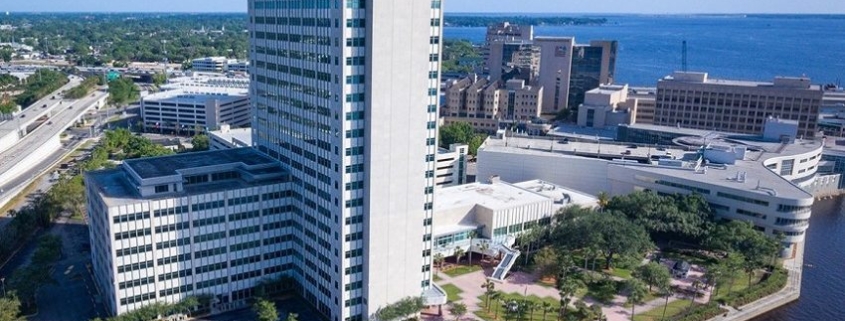Group Seeking Medical Offices Spends $67M On Jacksonville Office Tower
An Atlanta group scooped up a downtown Jacksonville tower for $67 million after seeing an opportunity where others saw a run-of-the-mill office asset.
ShareMD LLC, a medical property owner and operator, bought the 22-story 841 Prudential on the Baptist Medical Center campus from Chicago-based real estate investor GEM Realty Capital Inc.
841 Prudential was marketed as a traditional office asset for administrative users, but ShareMD — with help from The Easton Group brokerage arm Easton & Associates in Doral — saw the potential for clinical office uses.
“That was the value that we saw in the building. Everyone else was valuing it just as a professional office but we said, ‘Well, because of the proximity to Baptist and the geographic location, there is a unique opportunity to reposition the building to medical office to achieve higher rents and fill the vacancy,’ ” said Elliot LaBreche, The Easton Group vice president who represented ShareMD in the purchase.
LaBreche closed the transaction Feb. 20. CBRE Group Inc. represented seller GEM Realty.
“841 Prudential was nearly 80% occupied when sold with 15% of that already used by health care providers uses such as neurologists and pediatricians,” LaBreche said.
ShareMD wants to retrofit the vacant space concentrated on the lower floors to medical offices, meaning 35% of the building would become clinical space. If other vacancies open in the administrative space, ShareMD plans to reposition that space to increase the medical uses at 841 Prudential.
“While repositioning requires upfront spending, it’s expected to pay off later. Clinical offices command rents that are 10-15% more than traditional office rents,” LaBreche said.
ShareMD’s plans a $7 million investment to convert offices for clinical users. 841 Prudential has the advantage of undergoing a $6 million renovation two years ago. On the demand side, the Baptist campus faces natural growth constraints. It’s bound by the St. Johns River to the north and Interstate 95 and the Acosta Expressway on other sides. This leaves 841 Prudential well-positioned to absorb health-related growth.
“ We are talking to a very large orthopedics group that is affiliated with Baptist right now,” LaBreche said.
The larger Jacksonville medical office market is healthy with citywide occupancy slightly less than 95%, the highest nationally, according to Maryland-based medical office research company Revista.
The riverfront 841 Prudential has 500,000 square feet of leasable space on a 6.5-acre lot. It was built in 1955 as the city’s first skyscraper. Some of the larger tenants already are medical companies with administrative offices. They include Baptist, University of Florida Health and One Call, which connects injured workers with health care providers.
ShareMD is on a medical buying spree, spending $100 million in four months. The company is focusing on key markets such as Orlando, Tampa, Fort Lauderdale and Miami, where two purchases totaled $33 million. Its business model of building out clinical space benefits doctors as well as patients. ShareMD leases its clinical space short-term by the half-day, day, week or month, giving health care providers an opportunity to expand their geographic footprint and reach more patients.
“We are excited to be in South and North Florida and look forward to rounding out our Florida portfolio with additional assets over the coming months,” George Scopetta, president and managing partner of ShareMD, said in a news release. “With an aging baby boomer population, a burgeoning demand for health care services and insurance companies favoring outpatient care, we think the timing is perfect to execute our business plan in Florida. The opportunity is endless.”
Source: DBR



